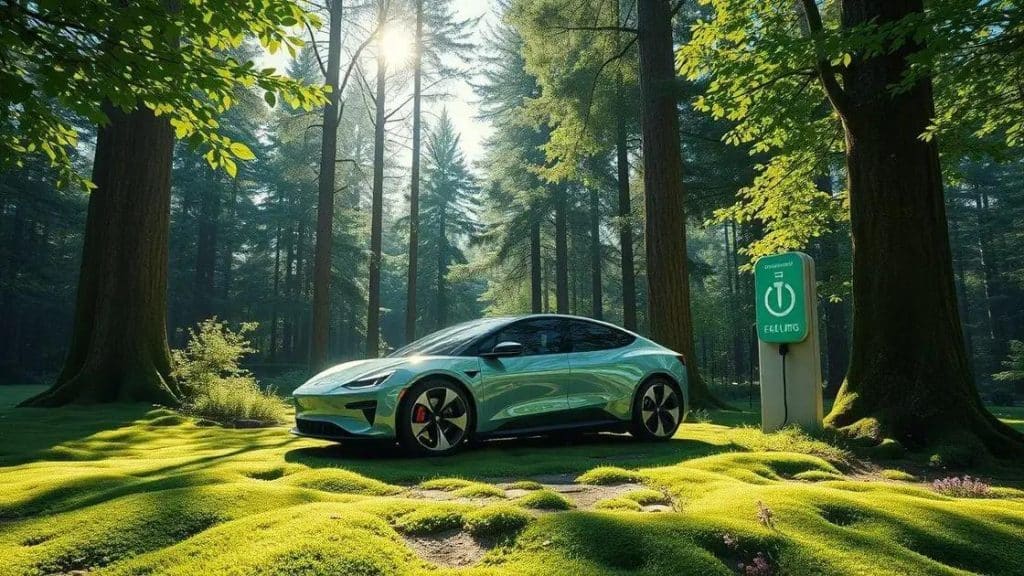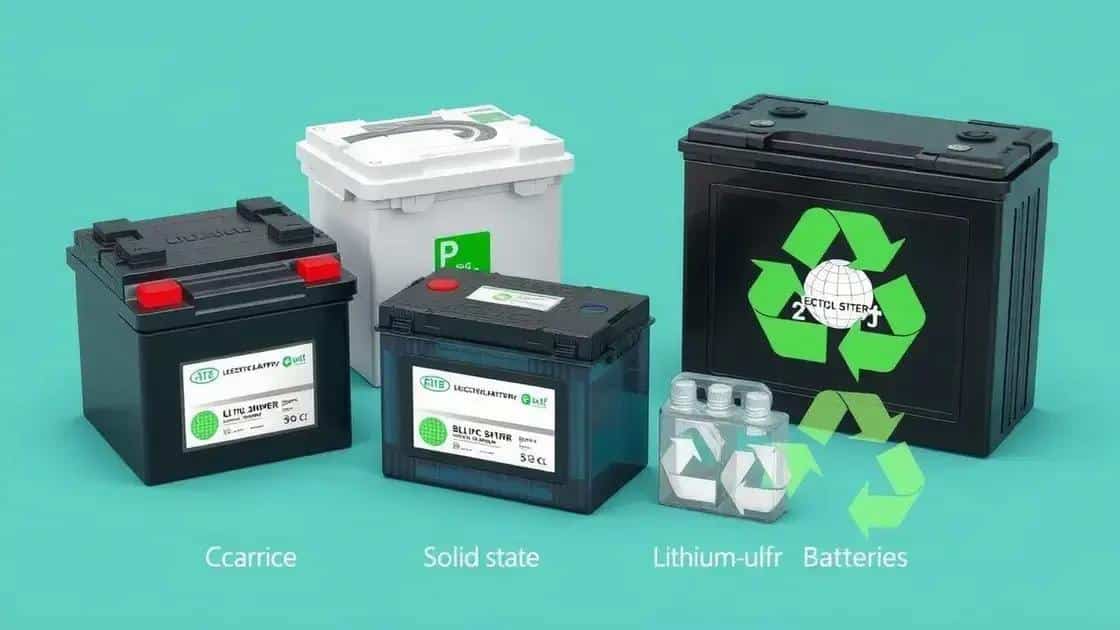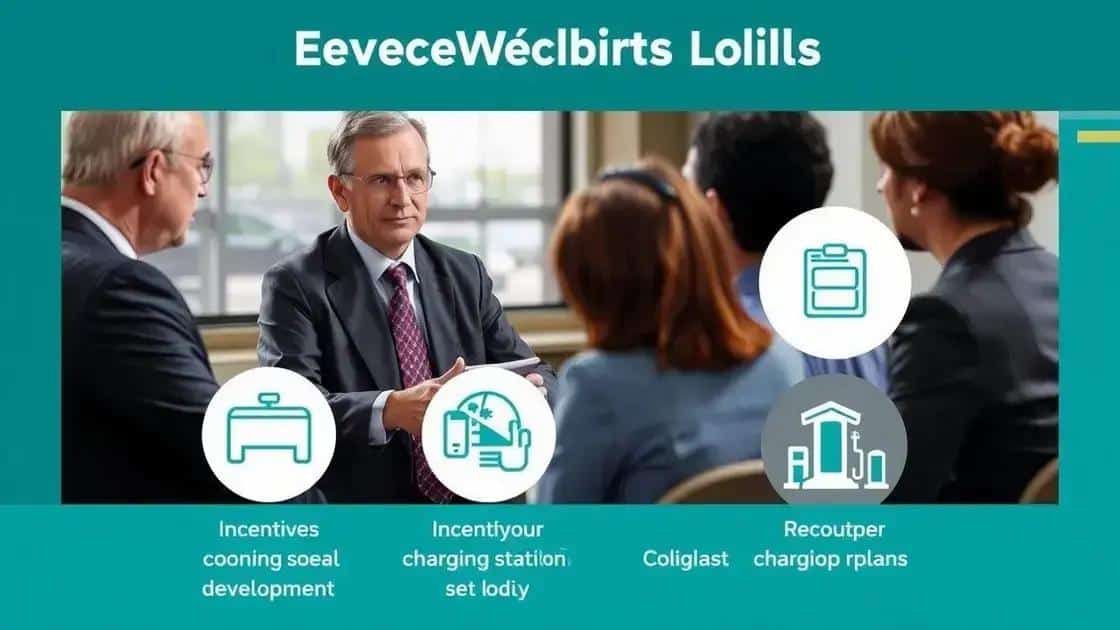What’s new in electric vehicle news: exciting developments

Government policies and advancements in charging infrastructure are crucial in accelerating electric vehicle adoption, providing financial incentives and ensuring convenient access to charging stations for consumers.
What’s new in electric vehicle news captures the pulse of an ever-evolving industry. Every day, there are innovations that could change how we think about transportation, don’t you think? Let’s dive into the most exciting updates.
Latest electric vehicle models hitting the market
The electric vehicle market is seeing exciting new additions. Innovations in design and technology are making electric vehicles (EVs) more appealing than ever. Many automakers are shifting gears to meet growing consumer demand, and it’s fascinating to see what’s coming.
Notable Releases in 2023
This year, several new models are making waves. Companies are investing heavily in cutting-edge technology to enhance performance and efficiency.
- The Tesla Model Y, with its impressive range and features, continues to lead the pack.
- The Ford Mustang Mach-E combines style with sustainability, attracting curvy car enthusiasts.
- Rivian’s R1T is making a splash as an adventure-ready electric pickup.
- The Hyundai Ioniq 5 is recognized for its futuristic design and rapid-charging capabilities.
In addition to these, some legacy brands are embracing the electric wave. For instance, GM is working on their Chevrolet Bolt EV updates, promising better battery life and added features. Luxury brands aren’t left behind either; the Porsche Taycan offers thrilling acceleration paired with eco-friendly technology.
Design Innovations
Design is a critical factor in attracting buyers. Today’s EVs are not only about performance but also aesthetic appeal. Many new models are equipped with interiors that feature premium materials and the latest tech interfaces, creating a luxurious experience.
With advances in aerodynamics and battery technology, electric vehicles are becoming more efficient. This means longer ranges and faster charging times, making them more practical for everyday use. As the industry evolves, the latest electric vehicles now offer an array of options to suit different lifestyles, whether for families, adventures, or city commuters.
As we see more models hitting the market, it’s evident that the future of transportation is electric, and this shift is poised to benefit both consumers and the environment.
Technological advancements in electric vehicle batteries

Technological advancements in electric vehicle batteries are reshaping the automotive landscape. These innovations are crucial for improving the efficiency and performance of electric vehicles (EVs). The goal is to create batteries that can last longer and charge faster, making EVs more accessible to everyone.
New Battery Technologies
One of the most exciting developments is the emergence of solid-state batteries. Unlike traditional lithium-ion batteries, these new batteries use solid electrolytes, which can significantly enhance safety and energy density. This means greater range and fewer fire risks for consumers.
- Enhanced Safety: Solid-state batteries are less prone to overheating.
- Higher Energy Density: They can store more energy in a smaller space.
- Longer Lifespan: These batteries can outlast conventional batteries, providing better longevity.
- Faster Charging Times: Solid-state batteries can be charged in a shorter period.
In addition to solid-state technology, companies are exploring lithium-sulfur batteries. This alternative boasts a much higher theoretical energy density than current lithium-ion batteries. Although they are still in development, the potential benefits could be staggering for consumers. Companies like Tesla are heavily investing in research to bring this technology to market, aiming for a game-changer in range and efficiency.
Battery Recycling and Sustainability
As EV adoption continues to grow, the need for sustainable practices has never been greater. Battery recycling is becoming an essential part of the conversation. Improved recycling processes can help recover valuable materials, reducing waste and the environmental impact of battery production.
Many manufacturers are taking steps to build recycling programs that minimize the carbon footprint of battery production. By recycling old batteries, we can even reuse critical materials like lithium and cobalt, making the EV supply chain more sustainable.
The path ahead is filled with promise as technological advancements continue to evolve. With these innovations, the future of electric vehicles looks bright, paving the way for an environmentally friendly transportation revolution.
Charging infrastructure improvements for electric vehicles
Charging infrastructure improvements for electric vehicles (EVs) are essential for widespread adoption. As more drivers consider switching to EVs, having access to reliable charging stations is increasingly important. This infrastructure ensures that charging is convenient and efficient for all users.
Expansion of Charging Networks
In recent years, we have seen significant investments in expanding charging networks across various regions. Many cities and states are working together to increase the number of fast-charging stations. This expansion includes placing chargers in urban areas, highways, and remote locations.
- Fast Charging Stations: These stations can charge an EV in 30 minutes or less, making long trips easier.
- Home Charging Solutions: Innovative home charging systems allow users to charge overnight, ensuring their vehicles are ready every morning.
- Public Charging Systems: Local governments are implementing plans to install chargers in parks, shopping centers, and office buildings.
- Partnerships with Businesses: Collaborations with major retailers enable easy access to charging while shopping.
In addition to increasing the number of charging stations, improvements in charging technology are enhancing user experience. Smart chargers can now provide real-time information about charger availability and pricing. This visibility helps users plan their trips and reduces charging time.
Government Incentives and Regulations
Government support is crucial for expanding charging infrastructure. Many countries are implementing regulations that require new buildings to include EV charging stations. Additionally, various incentives encourage businesses to install chargers.
Grants and tax credits are being offered to help offset installation costs for both public and private charging stations. These incentives boost the development of a robust network. They also reassure consumers that charging will be widely available as EV adoption grows.
As the charging infrastructure improves, challenges remain, but these advancements promise a brighter future for electric vehicle users. With increased accessibility and efficiency, we can expect more drivers to make the switch to electric vehicles.
Government policies influencing electric vehicle adoption

Government policies play a significant role in influencing electric vehicle (EV) adoption. With various incentives and regulations, governments strive to accelerate the transition to cleaner transportation. These measures can effectively encourage consumers and manufacturers to embrace electric vehicles more readily.
Incentives for Consumers
Many governments offer financial incentives to make electric vehicles more appealing to buyers. These incentives serve to lower the overall cost of purchasing an EV. Some popular incentives include tax credits, rebates, and grants.
- Tax Credits: Consumers may receive significant deductions on their tax returns when purchasing an EV.
- Rebates: Some states provide immediate cash rebates when you buy an electric vehicle.
- Reduced Registration Fees: EV owners often enjoy lower registration fees compared to traditional vehicles.
- Access to Carpool Lanes: In many regions, EVs can use carpool lanes, enhancing travel efficiency.
Such incentives not only reduce the financial burden but also promote awareness of the environmental benefits associated with electric vehicles. As more drivers transition to EVs, the demand for a sustainable future grows stronger.
Regulatory Measures
Beyond financial incentives, regulatory policies are essential for shaping the electric vehicle landscape. Many governments are setting ambitious targets aimed at reducing greenhouse gas emissions. These targets affect vehicle regulations and production timelines.
For instance, several countries aim to ban the sale of new gasoline and diesel cars within the next two decades. This push for zero-emission vehicles creates a clear path for manufacturers to invest in electric vehicle development.
Moreover, regulations often include requirements for automakers to offer a certain percentage of electric models in their lineup. This ensures that consumers have access to various EV options, encouraging adoption across different demographics.
As these policies evolve, they indirectly influence infrastructure development as well. Increased investments in charging stations and incentives for their installation encourage both manufacturers and consumers to adopt electric vehicles.
FAQ – Frequently Asked Questions about Electric Vehicle Adoption
What are some government incentives for buying an electric vehicle?
Many governments offer tax credits, rebates, and reduced registration fees to encourage the purchase of electric vehicles.
How has charging infrastructure improved for electric vehicles?
The number of charging stations has increased significantly, with many cities investing in fast-charging networks and home charging solutions.
What technological advancements are being made in electric vehicle batteries?
Innovations like solid-state batteries and lithium-sulfur batteries are increasing energy density and safety while reducing charging times.
Why are government regulations important for electric vehicle adoption?
Regulations set targets for zero-emission vehicles, prompting manufacturers to develop more EV models and invest in sustainable practices.





